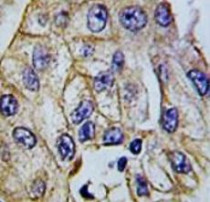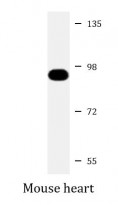ARG40415
anti-TLR2 antibody
anti-TLR2 antibody for IHC-Formalin-fixed paraffin-embedded sections,Western blot and Human,Mouse
Overview
| Product Description | Rabbit Polyclonal antibody recognizes TLR2 |
|---|---|
| Tested Reactivity | Hu, Ms |
| Tested Application | IHC-P, WB |
| Host | Rabbit |
| Clonality | Polyclonal |
| Isotype | IgG |
| Target Name | TLR2 |
| Antigen Species | Mouse |
| Immunogen | KLH-conjugated synthetic peptide corresponding to aa. 720-749 of Mouse TLR2. |
| Conjugation | Un-conjugated |
| Alternate Names | CD antigen CD282; TIL4; CD282; Toll/interleukin-1 receptor-like protein 4; Toll-like receptor 2 |
Application Instructions
| Application Suggestion |
|
||||||
|---|---|---|---|---|---|---|---|
| Application Note | * The dilutions indicate recommended starting dilutions and the optimal dilutions or concentrations should be determined by the scientist. | ||||||
| Positive Control | Mouse heart | ||||||
| Observed Size | ~ 94 kDa |
Properties
| Form | Liquid |
|---|---|
| Purification | This antibody is prepared by Saturated Ammonium Sulfate (SAS) precipitation followed by dialysis against PBS. |
| Buffer | PBS and 0.09% (W/V) Sodium azide. |
| Preservative | 0.09% (W/V) Sodium azide. |
| Storage Instruction | For continuous use, store undiluted antibody at 2-8°C for up to a week. For long-term storage, aliquot and store at -20°C or below. Storage in frost free freezers is not recommended. Avoid repeated freeze/thaw cycles. Suggest spin the vial prior to opening. The antibody solution should be gently mixed before use. |
| Note | For laboratory research only, not for drug, diagnostic or other use. |
Bioinformation
| Database Links | |
|---|---|
| Gene Symbol | TLR2 |
| Gene Full Name | toll-like receptor 2 |
| Background | The protein encoded by this gene is a member of the Toll-like receptor (TLR) family which plays a fundamental role in pathogen recognition and activation of innate immunity. TLRs are highly conserved from Drosophila to humans and share structural and functional similarities. They recognize pathogen-associated molecular patterns (PAMPs) that are expressed on infectious agents, and mediate the production of cytokines necessary for the development of effective immunity. The various TLRs exhibit different patterns of expression. This gene is expressed most abundantly in peripheral blood leukocytes, and mediates host response to Gram-positive bacteria and yeast via stimulation of NF-kappaB. [provided by RefSeq, Jul 2008] |
| Function | Cooperates with LY96 to mediate the innate immune response to bacterial lipoproteins and other microbial cell wall components. Cooperates with TLR1 or TLR6 to mediate the innate immune response to bacterial lipoproteins or lipopeptides. Acts via MYD88 and TRAF6, leading to NF-kappa-B activation, cytokine secretion and the inflammatory response. May also promote apoptosis in response to lipoproteins. Recognizes mycoplasmal macrophage-activating lipopeptide-2kD (MALP-2), soluble tuberculosis factor (STF), phenol-soluble modulin (PSM) and B.burgdorferi outer surface protein A lipoprotein (OspA-L) cooperatively with TLR6. [UniProt] |
| Cellular Localization | Membrane; Single-pass type I membrane protein. Cytoplasmic vesicle, phagosome membrane; Single-pass type I membrane protein. Membrane raft. Note=Does not reside in lipid rafts before stimulation but accumulates increasingly in the raft upon the presence of the microbial ligand. [UniProt] |
| Calculated MW | 90 kDa |
| PTM | Glycosylation of Asn-442 is critical for secretion of the N-terminal ectodomain of TLR2. [UniProt] |
Images (3) Click the Picture to Zoom In
-
ARG40415 anti-TLR2 antibody IHC-P image
Immunohistochemistry: Mouse kidneys stained with ARG40415 anti-TLR2 antibody at 1:500 dilution.
From Yan Yuan et al. Open Life Sciences (2022), doi: 10.1515/biol-2022-0506, Fig. 5a.
-
ARG40415 anti-TLR2 antibody IHC-P image
Immunohistochemistry: Formalin-fixed and paraffin-embedded Human lung carcinoma tissue stained with ARG40415 anti-TLR2 antibody.
-
ARG40415 anti-TLR2 antibody WB image
Western blot: 20 µg of Mouse heart lysate stained with ARG40415 anti-TLR2 antibody at 1:2000 dilution.










